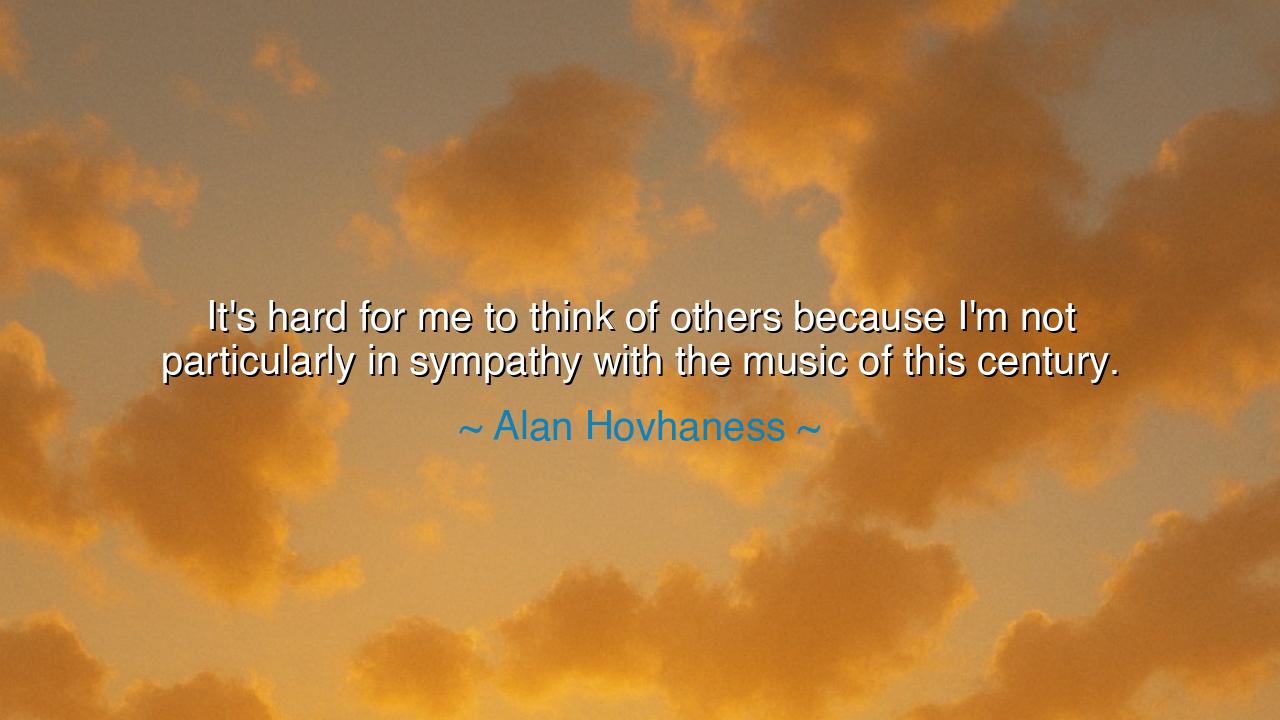
It's hard for me to think of others because I'm not particularly
It's hard for me to think of others because I'm not particularly in sympathy with the music of this century.






Hear the voice of Alan Hovhaness, composer of mystical harmonies, who confessed with candor: “It’s hard for me to think of others because I’m not particularly in sympathy with the music of this century.” In this statement lies not arrogance, but a deep estrangement—a spirit born of another age, finding itself out of step with the sounds and fashions that surrounded him. His words are not merely about notes and melodies, but about the struggle of every soul that cannot reconcile its inner vision with the spirit of its time.
The meaning of his saying rests in the nature of sympathy. To be “in sympathy” with an art, an age, or a people is to feel in harmony with them, to share their rhythm. Hovhaness admitted that with the music of the twentieth century—the age of serialism, dissonance, and experiment—he found no such harmony. His heart yearned for melodies that soared, for mystical tones that sought the eternal, rather than the fractured voices of modernity. And because he felt this distance, it was hard for him to “think of others,” to join fully in the community of his peers, for his music sprang from another well, flowing in a different direction.
This struggle is not his alone. Consider the story of Beethoven in his later years, when his deafness had cut him off from the world. The salons of Vienna were filled with light operas and easy tunes, yet he, no longer “in sympathy” with such trends, wrote the Ninth Symphony, a work that broke the bounds of tradition. He stood apart, and in his alienation created a monument that spoke not to the tastes of his century, but to the eternal longing of the human spirit. So too did Hovhaness, estranged from his age, compose works of mystical depth that still rise above the fashions of his time.
History teaches us again through the tale of Vincent van Gogh. Surrounded by the art world of Paris, where Impressionists and academicians pursued their own visions, van Gogh often felt alien, out of place, unable to be “in sympathy” with the market or the critics. Yet in his estrangement he painted the skies aflame with stars and the fields alive with spirit. His genius was born not in harmony with his age, but in defiance of it. So it is with Hovhaness’s words: the pain of being out of step with the century is real, yet it is also the soil from which timeless art is born.
The lesson here is profound: do not despair if you find yourself out of tune with your time. To lack sympathy with the fashions of the present does not mean you are wrong—it may mean only that your voice is destined to speak to another audience, perhaps to generations not yet born. The greatest creators, prophets, and thinkers have often been those who felt alienated, who confessed that it was “hard to think of others” because the age around them sought different things. Their alienation was their freedom, and their freedom was their gift to the future.
Practical action follows: if you feel out of sympathy with your time, do not surrender your vision to fit in. Instead, nurture it. Deepen it. Create from it. Seek those few who understand, but do not despair if they are few, for history shows that one voice out of step with its century can echo through millennia. Live faithfully to the music within you, whether it be literal melody, or the figurative song of your purpose.
So let Hovhaness’s words be remembered not as a lament alone, but as a call to courage. To be out of sympathy with the music of the century may feel like exile, yet it is often the mark of one whose art belongs not merely to the present, but to eternity. Stand firm, then, in your difference, and let your voice ring true—for though the world may not always listen, the ages surely will.






AAdministratorAdministrator
Welcome, honored guests. Please leave a comment, we will respond soon